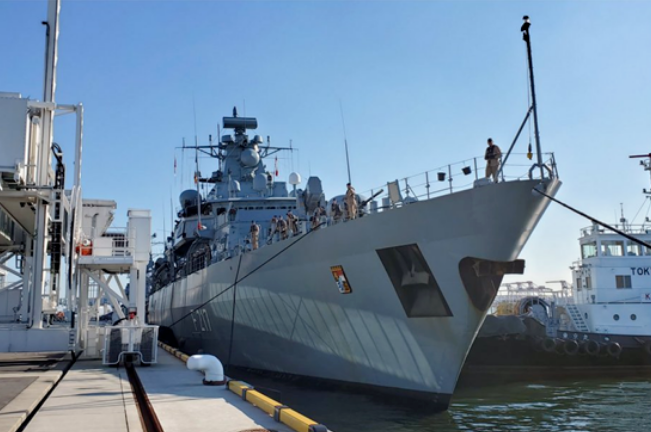By Li Xiaobo

This file photo shows the naval Frigate Bayern of Germany visiting Japan.
German Defense Minister Boris Pistorius recently revealed that the German Army plans to visit Japan next year, with the ground troops of both countries officially implementing joint training for the first time. On May 7, Germany dispatched warships to the Pacific for a several-month training mission. To demonstrate the significance of safeguarding international order, Germany has decided to deepen relations with partners in the Indo-Pacific region, and the German Army and the Japan Ground Self-Defense Force (JGSDF) are conducting consultations to facilitate the incoming joint training in Japan, as stated by Pistorius. Why has Germany, as a country outside the Asia-Pacific, persisted in strengthening its military intervention in this region?
Cao Weidong, a military observer, believed that the upcoming joint Germany-Japan military exercise aims to break their respective restraints, and attempts to restore their so-called "normalized countries". The US, which instigates the joint military exercise from behind, hopes to take advantage of the military strength of Germany and Japan to advance its "Indo-Pacific Strategy" and engage in majorpower confrontation.
On May 7, the German frigate Baden-Wurttemberg and supply ship Frankfurt am Main set sail for the Pacific for a several-month training mission. The German side stated that the deployment of two ships is part of Germany's plan in the Indo-Pacific region, and is also the most important step for the German Navy this year.
Cao Weidong believed that Germany's act of dancing to the tune of the US aims to highlight its influence and key role in the Asia-Pacific region, and to make Germanyan important strategic pawn in the US' major power competition strategy. Germany has been expanding its military deployment in Asia by demonstrating military strength and participating in joint training. The US' act of building its Asia-Pacific version of NATO also intends to gather NATO's military power in the targeted region. This time, Germany's several-month training mission with warships sent to the Pacific is actually designed to achieve its global military deployment through cross-continental training in far seas in the name of the US advancement of the "Indo-Pacific Strategy.”
Since the end of World War II, Germany has always kept a low profile in the field of military security. In recent years, Germany, however, has extended its strategic reach towards the Asia-Pacific region, while continuously broadening the scale and intensity of military construction. On April 4, Germany launched the most comprehensive military reform since the Cold War, involving increasing defense expenditure, adjusting the structure and command relationships of its national defense force, and even possibly restoring the compulsory military service system.
According to Cao Weidong, Germany is an important member of NATO. Since the outbreak of the Russia-Ukraine conflict, Germany has actively followed the US and provided weapons and equipment to Ukraine, resulting in the deterioration of relations with Russia. Germany thereby believes that its own security is threatened and proposes to increase defense expenditure and accelerate military construction. Nevertheless, its increased defense expenditure is used forthe purchase of US weapons and equipment, and it is self-evident who is benefiting from the expenditure. Meanwhile, Germany's military expansion towards the Asia-Pacific region is also in response to the US' advancement of major power confrontation. In this case, other countries in the Asia-Pacific region can only further enhance their own national defense capabilities in face of the deteriorating security situation.
Editor's note: Originally published on military.cnr.cn, this article is translated from Chinese into English and edited by the China Military Online. The information and opinions in this article do not necessarily reflect the views of eng.chinamil.com.cn.













